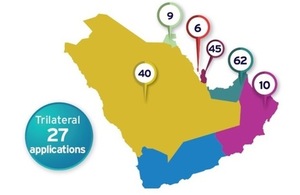UK Government to fund cutting edge UK-Qatar research project
£400,000 research grant for UK and Qatar scientists on renewable energy

Map showing the location and quantity of applications received after BEIS and the British Council’s call out for Institutional Links applications. The UK government will be funding eight of these projects over the next 2 years.
UK and Gulf scientists will be working together on eight cutting edge research projects across the six Gulf countries thanks to £2.8 million in UK government funding allocated to research projects in areas ranging from nanotechnology to cyber-security. The funding will strengthen scientific ties between the UK and the Gulf region in order to find solutions to shared global challenges.
The British Ambassador to the state of Qatar, HE Mr Ajay Sharma said:
I am delighted that we received so many joint UK-Qatar proposals. They emphasise the strength of our countries’ research community; and demonstrate our shared commitment to work together in addressing the needs of Qatar and the Gulf, in particular on renewable energy, water, food security and information technology. I am delighted that Qatar University has been jointly awarded this £400,000 research grant in the area of renewable energy. The UK is a word-leader on science and innovation and wants to see its collaboration with Qatar in this important area grow.
The UK Department for Business, Energy and Industrial Strategy- in partnership with the British Council- launched an open call for joint research applications in six GCC countries in July 2016. The call received a very high response rate, with 172 applications being put forward from HE institutions and research bodies in the region. The themes of the call closely tie into Gulf countries’ priorities such as food and nutrition, water, energy, food-water-energy nexus and cyber security.
The applications underwent peer-review by leading international academics. These cover each Gulf country, with two applications awarded in Saudi Arabia, two in the UAE and one for each of the other Gulf States. Each recipient will be granted up to £400,000 for the two year projects. The UK and Gulf based scientists and researchers will work together to ensure these collaborations achieve maximum impact for the UK and the GCC countries and establish long-term partnerships in key research areas.
The UK-Qatar research project will cover renewable energy. Bringing together researchers from the University of Newcastle and Qatar University, the project seeks to better understand the combustion processes for biogases. This renewable energy source obtained from landfill, animal and human bio-waste processes offers a potential fuel for electricity generation and the automotive industry. The partnership has identified opportunities in Qatar due to the presence of existing oil and gas companies and will pair gulf experimental expertise with UK supercomputer modelling.
Amir Ramzan, Director British Council Saudi Arabia noted:
The huge number of applications received made this one of our most successful open calls globally. There is clearly great appetite in the Gulf region for sharing knowledge and ideas with the UK. These projects are in strategic research areas that will support the transition to sustainable knowledge based economies in the Gulf.
The GSIKE (Gulf, Science, Innovation and Knowledge Economy) programme has already seen over 226 scientists across the Gulf participate in research symposia and capacity building workshops in the last twelve months. It will continue to pave the way for long term research collaboration over the next 3 years, through workshops, symposia and talks which will bring together UK and Gulf researchers, research institutions, funding agencies, industry, Higher Education councils, and education ministries.
About the UK government’s Gulf, Science, Innovation and Knowledge Economy Programme
The Institutional Links funding is a part of the UK Government’s £9 million Gulf Science Innovation and Knowledge Economy Programme. This new strategic and financial commitment to strengthen partnerships with the Gulf countries (Bahrain, Kuwait, Oman, Qatar, Saudi Arabia and the United Arab Emirates) is led by the Department for Business, Energy and Industrial Strategy. The GSIKE programme recognizes that addressing these challenges requires an integrated research and innovation approach, bringing together researchers from different disciplines, sectors, and countries in high-quality collaborations.
About the British Council in the Gulf
The British Council is the UK’s international organisation for cultural relations and educational opportunities. We create friendly knowledge and understanding between the people of the UK and other countries. Using the UK’s cultural resources we make a positive contribution to the countries we work with – changing lives by creating opportunities, building connections and engendering trust.
We work with over 100 countries across the world in the fields of arts and culture, English language, education and civil society. Each year we reach over 20 million people face-to-face and more than 500 million people online, via broadcasts and publications.
Founded in 1934, we are a UK charity governed by Royal Charter and a UK public body. The majority of our income is raised delivering a range of projects and contracts in English teaching and examinations, education and development contracts and from partnerships with public and private organisations. Eighteen per cent of our funding is received from the UK government.
We have been working in the Gulf for over 60 years and have teaching operations in the United Arab Emirates, Qatar, Kuwait, Bahrain, Saudi Arabia and Oman.
For more information, please contact: gisele.razzouk@fco.gov.uk